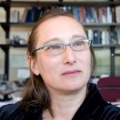Judith Frydman, PhD, is the Donald Kennedy Chair in humanities and sciences and a professor in the Departments of Biology and Genetics at Stanford University. She received her PhD in biochemistry from the University of Buenos Aires, Argentina and received postdoctoral training in Ulrich Hartl’s lab, where she discovered the eukaryotic ring-shaped chaperonin TRiC/CCT and showed protein folding in eukaryotic cells occurs cotranslationally with the aid of molecular chaperones as polypeptides emerge from ribosomes.
The Frydman lab is focused on understanding how the network of molecular chaperones and the ubiquitin-proteasome pathway maintain proteostasis in eukaryotic cells and how its dysfunction leads to disease and aging. Dr. Frydman’s lab also harnesses these insights to develop therapeutic approaches to ameliorate human diseases including neurodegenerative diseases and to identify specific interventions that disfavor the production of toxic protein species.


